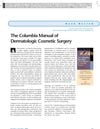 2 citations,
January 2020
2 citations,
January 2020 The document describes a method for preparing hair for microscopy by embedding it in plastic, cutting it, and storing it cold before imaging.
 21 citations,
January 2015 in “Oncology Research and Treatment”
21 citations,
January 2015 in “Oncology Research and Treatment” Scalp cooling can prevent hair loss in 65% of chemotherapy patients, especially effective in breast cancer patients and certain chemotherapy types.
 12 citations,
January 2010 in “Hair transplant forum international”
12 citations,
January 2010 in “Hair transplant forum international” The survival rates of hair grafts are similar regardless of how they are trimmed.
 53 citations,
June 1982 in “The BMJ”
53 citations,
June 1982 in “The BMJ” Cooling the scalp below 22°C before and during chemotherapy can help prevent hair loss.
 46 citations,
December 2007 in “International Journal of Cardiology”
46 citations,
December 2007 in “International Journal of Cardiology” People with polycystic ovary syndrome may have a higher risk of heart problems due to abnormal nervous system control of their heart and blood pressure.
 19 citations,
June 2018 in “Breast Cancer Research and Treatment”
19 citations,
June 2018 in “Breast Cancer Research and Treatment” Scalp cooling effectively prevents severe hair loss in breast cancer patients treated with docetaxel and is safe.
 7 citations,
October 2019 in “Klinická onkologie”
7 citations,
October 2019 in “Klinická onkologie” Cancer treatments often cause hair loss and damage, affecting patients' mental health.
 4 citations,
May 2013 in “Dermatologic Surgery”
4 citations,
May 2013 in “Dermatologic Surgery” Three new techniques simplify and improve the preparation of tissue samples for skin cancer surgery.
 2 citations,
May 2017 in “Endocrinology, diabetes & metabolism case reports”
2 citations,
May 2017 in “Endocrinology, diabetes & metabolism case reports” Lugol's solution can cause thyroid problems if used long-term for non-approved reasons.
 January 2024 in “Frontiers for young minds”
January 2024 in “Frontiers for young minds” Alopecia is a condition causing hair loss that can impact looks and mental health.
 November 2002 in “Skinmed”
November 2002 in “Skinmed” The book is a practical introduction to cosmetic dermatologic surgery for doctors.
 December 2017 in “Actas Dermo-Sifiliográficas”
December 2017 in “Actas Dermo-Sifiliográficas” Scalp cooling reduces chemotherapy-induced hair loss without increasing risk of skin metastases.
 198 citations,
July 2011 in “Cochrane library”
198 citations,
July 2011 in “Cochrane library” Lifestyle changes can improve body composition, excess male hormone levels, and insulin resistance in women with PCOS.
 165 citations,
September 2011 in “Journal of Public Policy & Marketing”
165 citations,
September 2011 in “Journal of Public Policy & Marketing” People who are more materialistic often expect life changes from buying things, leading to more debt and credit misuse.
 147 citations,
April 1994 in “Drug Safety”
147 citations,
April 1994 in “Drug Safety” Some drugs can cause hair loss or increase hair growth, but these effects are usually reversible when the drug is stopped.
 108 citations,
October 2004 in “Anesthesiology”
108 citations,
October 2004 in “Anesthesiology” Preoperative pain assessment, regional anesthesia, and vitamin C can help prevent CRPS after surgery.
 103 citations,
December 2011 in “Journal of the American Academy of Dermatology”
103 citations,
December 2011 in “Journal of the American Academy of Dermatology” Chemotherapy often causes temporary hair loss, which is distressing and needs better treatment and support.
 97 citations,
September 2006 in “Pharmaceutical Research”
97 citations,
September 2006 in “Pharmaceutical Research” No treatment fully prevents hair loss from chemotherapy yet.
 93 citations,
October 2006 in “The International Journal of Biochemistry & Cell Biology”
93 citations,
October 2006 in “The International Journal of Biochemistry & Cell Biology” Melanocytes are crucial for skin pigmentation and can affect conditions like melanoma, vitiligo, and albinism, as well as hair color and hearing.
 90 citations,
January 2021 in “Clinical Endocrinology”
90 citations,
January 2021 in “Clinical Endocrinology” Obesity increases the risk of developing polycystic ovary syndrome, and weight loss can improve the condition.
 89 citations,
November 2017 in “Journal of Cellular Physiology”
89 citations,
November 2017 in “Journal of Cellular Physiology” The Wnt/β-catenin pathway is important for tissue development and has potential in regenerative medicine, but requires more research for therapeutic use.
 74 citations,
March 2001 in “Seminars in Cutaneous Medicine and Surgery”
74 citations,
March 2001 in “Seminars in Cutaneous Medicine and Surgery” The document concludes that skin biopsies, genetic and environmental factors, and specific treatments are important in managing cutaneous lupus erythematosus.
 68 citations,
August 2014 in “Stem Cells Translational Medicine”
68 citations,
August 2014 in “Stem Cells Translational Medicine” Dermal papilla cells help wounds heal better and can potentially grow new hair.
 67 citations,
October 1997 in “Dermatologic Surgery”
67 citations,
October 1997 in “Dermatologic Surgery” The EpiLight Hair Removal System removed about 60% of hair with some side effects, and more research is needed to confirm long-term effectiveness.
 67 citations,
September 1997 in “Dermatologic Surgery”
67 citations,
September 1997 in “Dermatologic Surgery” The document concludes that good cosmetic outcomes in hair transplantation depend on the surgeon's artistic skill and careful planning.
 63 citations,
September 2009 in “Regenerative Medicine”
63 citations,
September 2009 in “Regenerative Medicine” Scientists found a way to grow human hair cells in a lab that can create new hair when transplanted.
 61 citations,
January 2019 in “American Journal of Clinical Dermatology”
61 citations,
January 2019 in “American Journal of Clinical Dermatology” The cause of Frontal Fibrosing Alopecia is unclear, diagnosis involves clinical evaluation and various treatments exist, but their effectiveness is uncertain.
 45 citations,
July 2002 in “The Neurologist”
45 citations,
July 2002 in “The Neurologist” A comprehensive approach to educating patients and managing side effects is crucial for improving adherence to multiple sclerosis treatments and patient quality of life.
 44 citations,
November 2010 in “Current Opinion in Supportive and Palliative Care”
44 citations,
November 2010 in “Current Opinion in Supportive and Palliative Care” Many patients find hair loss from chemotherapy very distressing, and while treatments like minoxidil and scalp cooling may help, there is no sure way to prevent it.
 41 citations,
April 2010 in “Gender Medicine”
41 citations,
April 2010 in “Gender Medicine” The conclusion is that hirsutism should be diagnosed and treated because it affects quality of life and may signal other health problems.






























